Anatomy of an Era: Gary Fouraker, Part 1
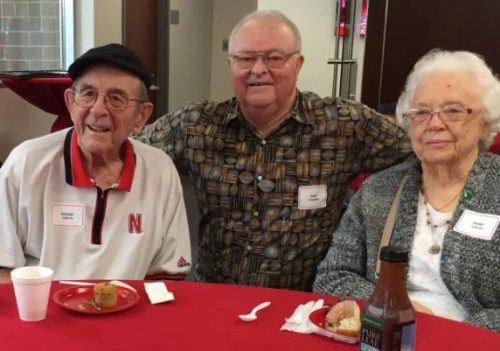
Although the dust storms and raining grasshoppers frightened me I felt bad for the hungry men and poor (Nebraska) farmers… Only later did I appreciate the thrift that the Depression enforced with a harsh hand, the lesson of never, even in the bad times, spending more than you earned. And in the good times, you saved and saved.
-Peter G. Peterson, The Education of an American Dreamer
Thriftiness: It’s one of the main tenets of the Boy Scout Law. It’s also an apt description of the man holding the University of Nebraska Athletic Department’s purse strings during that 60 & 3 era: Gary Fouraker.
It’s generally accepted that the best definition of thrift, of parsimony, of frugality and judicious money management is in spending your money wisely, the result of properly discerning a need from a want. A Nebraska farm boy would know the difference between the two in a country-second, and Gary’s keen eye on the finances of this big-time Division 1 operation enabled the mustering of resources, the development of facilities, and establishment of programs that rivaled and/or equaled any other school’s during that era.
And the payoff of such masterly miserliness? Many a teenage recruit left Lincoln’s weekend visit enamored of the environs, the arrangements and the resultant attitudes of those Husker Footballers already enjoying the campus conclave of Memorial Stadium. Let’s pay mind to Gary, another inside-man from those dominant days, and glean something profitable from his recollections.
Notable quote #1:
“To me it was like a big family. It was just like a small family business, is the way I would put it. We kind of overflowed into each other’s areas and just tried to work together.”
Gary Fouraker
Question: So Gary, when was your last year at Nebraska?
Gary Fouraker: 2002, just before all the crap hit the fan.
Q: (laughs) So I’m talking to a pretty sharp guy who knows when the heck to get out, huh?
GF: Yeah. (laughs)
Q: So where did you grow up?
GF: Well, I grew up on the farm in the southeast corner of Nebraska, near Salem and Dawson.
Q: Is that near Falls City?
GF: Yeah, near there. They were like a town of about 200 people and we lived right between those two. We had a crop farm and raised a few cattle and pigs and corn and milo and wheat and alfalfa. Then when I was in high school we moved off the farm and to Columbus, so I graduated from Columbus.
Q: They turned you into a city boy, huh?
GF: Yeah, I went from a school where there were three of us in the ninth grade to Columbus where there were like 180 in my class.
Q: That was a culture shock right there! Reminds me of my experience: I grew up in Petersburg, with a population of about 380, and a week later I’m sitting in an East Campus Chemistry class at the University with more people than that in one classroom. (laughs) So I would surmise that were you a Husker football fan as a kid. Did it mean anything to you?
GF: Oh yeah, I remember listening to the Gotham Bowl on the radio and things like that, Willie Ross and those guys.
Q: I heard they’re trying to bring that Gotham Bowl back in some shape or form.
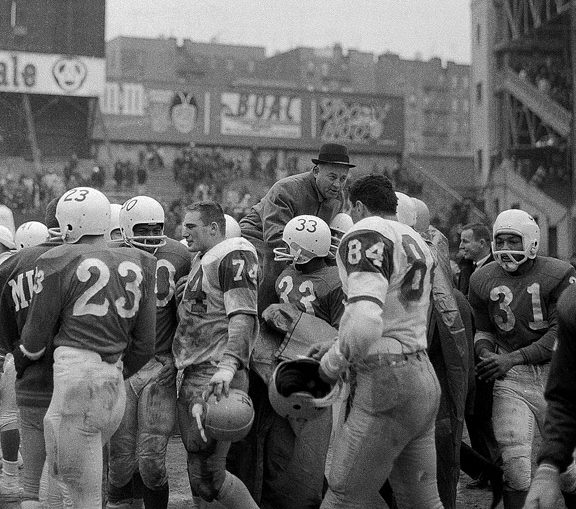
GF: I hear they’re trying.
Q: Anything to give Iowa State or Indiana a bowl game, huh? (laughs) That was a cheap shot, I know. So, did you go to school at the U?
GF: I went to Milford first- which was then Nebraska Technical College and now Southeast Community College- and studied computers and data processing.
Q: Wow, this was what… 1965?
GF: ’65 and ’66, yeah. And then I went to the University.
Q: So you did attend the University. Obviously it wasn’t much different from Milford, except a bigger campus and more kids?
GF: Oh yeah, and at that point in time they didn’t allow transfer of credits, so I ended up in Business College taking the same accounting class -the same book- and had to retake it because they wouldn’t take transfer credits.
Q: They must have thought you were a genius, eh? All straight A’s the second time around?
GF: No. (laughs)
Q: In other words, there were more girls on the Lincoln campus. Am I right?
GF: That, and one of my roommates was twenty-one, so it was the beer, too.
Q: So did you purposefully go to the Business College or was that just to fulfill some electives?
GF: No, that’s what I wanted to do. And I also worked at the Business College for the Bureau of Business Research, doing computer work and running reports for them, the various economic studies they were doing.
Q: You were one of the original IT guys, in other words?
GF: Yeah.
Q: So how did you make the jump to actually joining the Athletic Department? How did that happen?
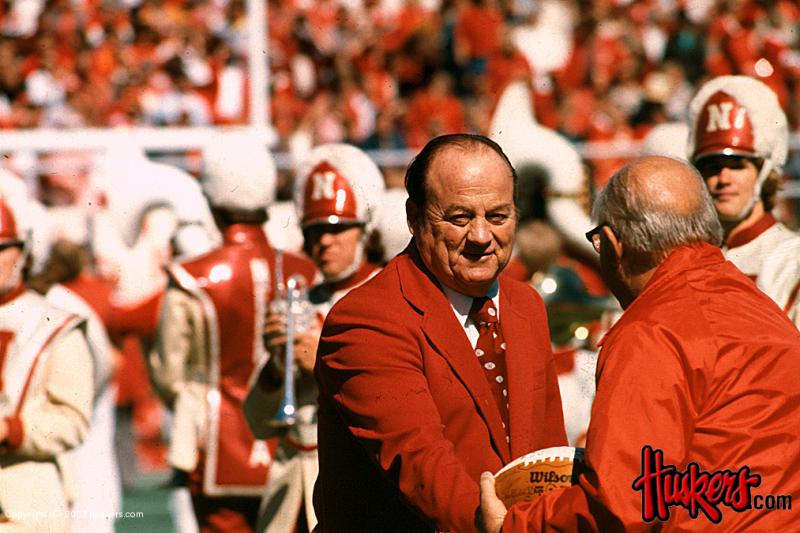
GF: Well, I went back to Milford and taught for two years -the same department I graduated from- then I decided that was not what I really wanted to do. So I went back to the University and started working in the University Administration and ended up as Director of Student Accounts, collecting your tuition and all that stuff. Then I headed up another group that worked with small computer systems on campus and did audit reports and was working doing the ticket audit and such… with the athletic department and helping them look for a computerized ticketing system. And that’s when Bill Fisher, the former Business Manager there, retired. I decided to interview for the job with Devaney in ’81 and he hired me.
Q: Wow, so can you take me back to that interview process? Were you sitting in the room with Bob Devaney?
GF: Yep, that was it. And, of course, I’d previously met with him to give him reports on the things we found in audits and things like that, so he knew who I was.
Q: So it wasn’t a ‘cold’ interview, you had some relative familiarity with each other. What was your position titled?
GF: I was Athletic Business Manager.
Q: So upon joining the staff, obviously Coach Osborne was running things and we were enjoying some pretty good football in those years. Anything stand out about the organization when you first joined on?
GF: Well, to me it was like a big family: you had Don Bryant and George Sullivan and Devaney, and of course Tom doing the football thing. Otherwise it kind of became George and I, especially, working quite close together, working on the physical plant, trying to make sure everything was running properly and that we had what we needed. It was just like a small family business, is the way I would put it. We kind of overflowed into each other’s areas and just tried to work together.
Q: And like any family, there’s probably a little bit of dysfunction, huh?
GF: Oh yeah! (laughs) I don’t know how well you knew Bob Devaney. (laughs)
Q: How would one put it? It was ‘exciting’ to work for Bob?
GF: It was. It was one of those things, you just never knew sometimes. (laughing) There’s kind of a story of when I was only a couple two, three years into it, and he was all concerned about the budget and I got kind of chewed out because we ended up in the red one year. And so the next year I made sure that I withdrew enough funds from our Foundation Funds and things like that to make sure our books showed us in the black. So he calls me in and chews me out because I showed a positive figure. He said, “How are we going to raise funds if we show a positive figure?” (laughs) Joe Selig and I always laughed at that one.
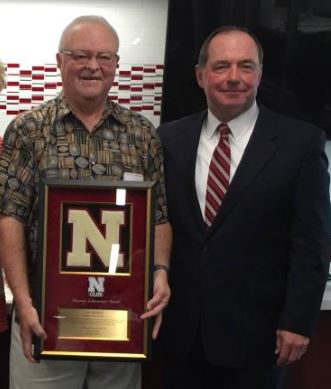
Q: So you couldn’t do right either way! He was thinking like a fundraiser and not an accountant, huh?
GF: Right. (laughs)
Q: I’m sure that soon thereafter Nebraska Athletics became completely self-supporting and always in the black?
GF: Well, for the most part. Part of the problem was the fiscal year ending June 30th and you had to close things out with the University and sometimes guess at what things were going to hit you kind of after the fact: you’d get billings from the University’s Physical Plant or some of those utilities that would hit you and you were just kind of guessing at what that may be. Sometimes you just had to guess.
Q: Sure, I deal with that all the time with my present job. I’m guessing the biggest unknown was planning on or trying to guess what the bowl payout was going to be, no?
GF: Well, no, not really, because that was pretty well established by the conference. Yeah, it might vary a little bit depending on how many schools within the conference went to bowls and which bowls they went to, but those things we could figure out pretty closely.
Q: So it wasn’t like you were going up into Coach’s office and asking, “Hey Tom, how strong do you think the conference is going to be this year?” (laughs)
GF: No, because the way the conference worked, you each got a single share. It wasn’t the situation like if we were going to the Orange Bowl, that we were going to be getting a lot more.
Q: So it wasn’t all boom or bust each year, huh?
GF: No.
Q: You ended your tenure there as Associate Athletic Director for Business Affairs. How long did you hold that title?
GF: Well, Bill Byrne changed my title. I was Assistant Athletic Director and then Associate Athletic Director. The job responsibilities weren’t really any different, it was just the change in title.
Q: And a bigger paycheck?
GF: Yeah, right! (laughs)
Q: Now tell me, Gary, what would the average day for you be comprised of? Could you take me through it?
GF: Well, I could try. That was the one thing about the job, it varied so much. You didn’t know from one day to the next what was going to hit you. My first responsibilities were the accounting and budgeting, the payroll, the scholarship monies, concession operations, computer operations, the ticket office at one time before they split that out, our souvenir store they built. Then I used to do all the football travel arrangements. And as we got into tournament time with basketball I helped them with their travel arrangements, as well.
Q: Those were usually quick trips, Gary. (laughs) I worked with the basketball teams during those years.
GF: But they were some fun ones! (laughs)
Q: A lot of one-and-outs down in Kansas City. I remember those.
GF: And the one when (Eric) Piatkowski was there and winning it all?
Q: That was the high point, Gary. So, of all those duties, what would you say was your most challenging?
GF: Well, probably the budgeting. We were getting so many demands from the University for funds. The state took away funding for the women’s sports and they took away funding for the Devaney Center, so we were absorbing those. And then it became more of a demand from the University for additional funds when we remodeled the Coliseum and built the Cook Pavilion and the Rec Center. We paid for all that. That became the biggest stress point, just trying to figure out where the money was coming from, (laughs) and we had enough to keep us afloat.
Q: And I’m supposing when Bill Byrne came on with his intense focus on Title IX and female equity in athletics, that put a strain on things for a short while there?
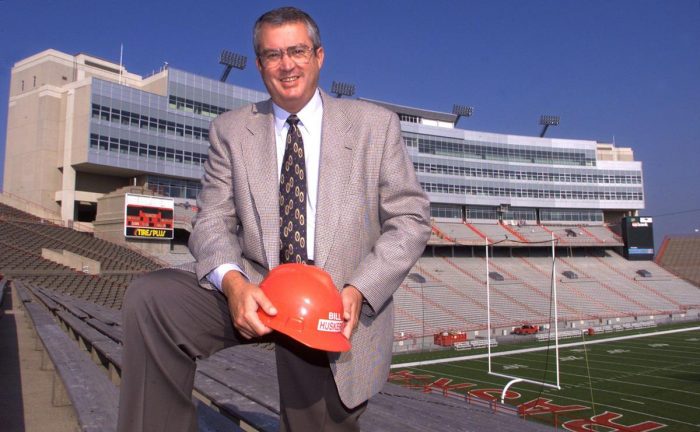
GF: Yeah, a little bit. Actually, not so much in that area. If it did, it was primarily in coaches’ salaries, trying to equalize across lines as much as possible, so that if you had softball coach not making a tenth of what a baseball coach was making you had to try to equalize those as much as possible. Those type of things.
Q: Kind of a juggling act? You’re looking at coaches among your department as well as coaches at other schools from a national aspect? I’m sure you burned up a few calculators…
GF: Yeah, it got interesting at times. And with football, too, especially. They were never ones to look too closely at budgets. (laughs) It was where you were trying to establish things. And the coaches, especially in the summertime, would be out visiting other schools and then come back with ideas where they felt they needed new equipment or things like that that we hadn’t budgeted for.
Q: Does anything come to mind as an example?
GF: I guess the main thing was changes in the video systems and things like that, “Hey, we need two hundred thousand dollars to do this.”
Q: Of course. ”We’ve got Moose Mohnsen and Bryan Carpenter and Dave Finn and we’re gonna start cutting film up and digitizing all of it.”
GF: Yeah. ”We need all new equipment and new computers and everything for the coaches and such to go with this…”
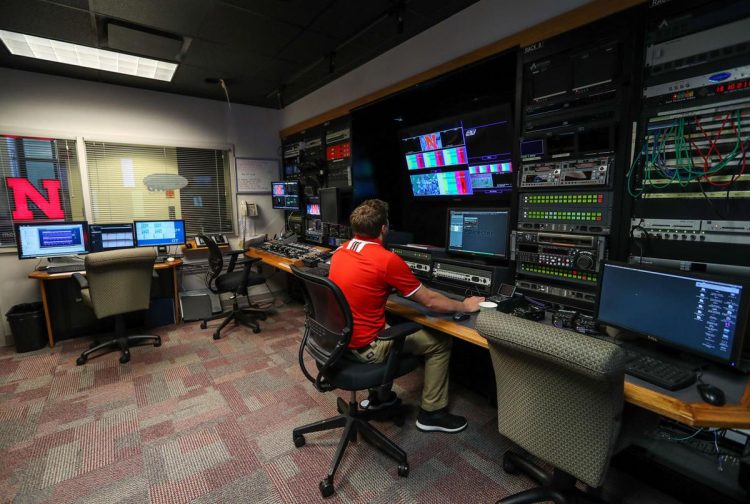
Q: I’m sure some of that dealt with Boyd’s infamous wish-lists, too, huh?
GF: Oh yeah, Boyd and I had a few discussions.
Q: I suppose it usually went something like him with a hand out and you wanting to keep yours in your pockets? (laughs)
GF: Well, internally it was a situation where you knew -especially with football, that’s where our bread & butter was- so you wanted to try to do everything you could to make it successful. So you tried to figure out how to do it, get it done.
Q: I’m picturing you as a metaphorical Presidential Physician, always having your finger on the leader’s pulse, then?
GF: Yeah.
Q: So was there always an Achilles’ heel, the budgets perhaps, something that made you stay a few extra minutes every day at work or keep you awake a few more minutes at night?
GF: It was primarily budgets, keeping on top of that to make sure at the end of the year you weren’t too far in the hole, and that you could state, ‘Hey, we know we’re going to be down this year, but we have an extra home game next year, so that’s going to give us this extra revenue,’ and got us covered.
Q: Needing to sell a few extra hotdogs and Cokes at the games? Some more Valentinos and Runzas and we’re covered, eh?
GF: Right. (laughs)
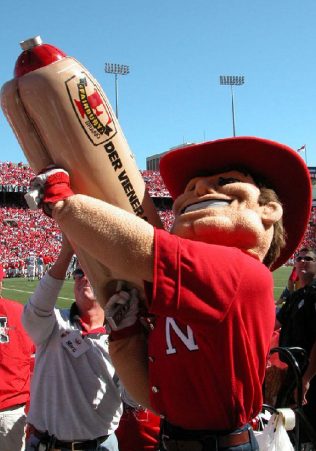
Q: Did you ever play much of a part in the negotiations with the visiting teams?
GF: I did some. It was kind of a joint effort. Tom and I worked together on some of those, Bill and I worked together on some of those, and the three of us sometimes worked together on some of those, contacting other teams and seeing if we could get a schedule set up and what kind of guarantees we would pay and things like that.
Q: Sure. So here’s a question: are there any matchups that never happened? Ones that were so close and would have been dream matchups for fans of college football, but never happened?
GF: Oh, yeah: Michigan. We tried to work with them so many times. (laughs) And to a point where I’d even gone ahead and prepared a contract and sent it off to them -and they indicated, “Yes,” they’d sign off on it and everything- but they never did.
Q: Any idea what years that would have been?
GF: Boy, I can’t remember right now, Paul. (laughs) So many of these things kind of run together.
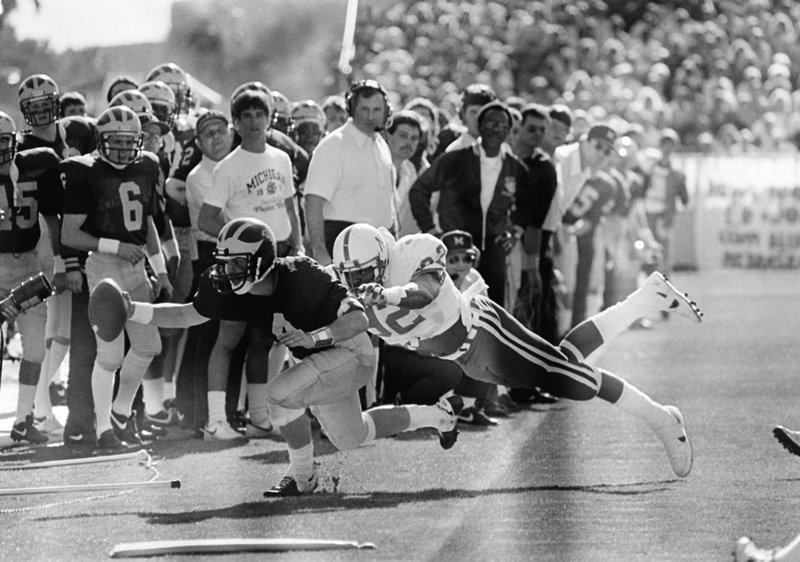
Q: Exactly. It’s like the longtime coaches and trainers, where they get to thinking that Irving Fryar and Ahman Green and Eric Crouch all played together on the same team after a while. (laughs)
GF: Yeah, after twenty one years of it they kind of run together.
Q: What was it like working with Tom Osborne? How would you describe your working relationship and how you co-operated?
GF: Well, we always got along well. Sometimes it was a little distracting because you never knew for sure when you were talking to him if he was listening to you or not. (laughs) He’s always thinking about other things. I mean, he was, but it just didn’t seem like you had his attention all the time. But evidently he had it enough to where he knew what he was doing.
Q: How would you guys work? By phone or in one another’s offices?
GF: Either one. Sometimes he’d just show up in my office or I’d run up to his.
Q: So you were 1st floor South Stadium?
GF: Yes.
Q: Any other coaches of that time? Did you have much interaction with the other guys?
GF: Oh yeah, practically all of them. And some of them, it was just social-type things. Turner, especially, and Tony Samuel, they were always just stopping in to shoot the bull. Milt -(laughs) especially away games- Milt would hold court at the pub after all the meetings and such the night before the game.
Q: After the kids were put to bed, so to speak?
GF: Especially if they had a karaoke bar. He’d get up there and sing and keep us entertained.
Q: Someone said Milt was the ‘Social Director’?
GF: Oh yeah. And Boyd and I, of course, became golf partners.
Q: Poor Gary!
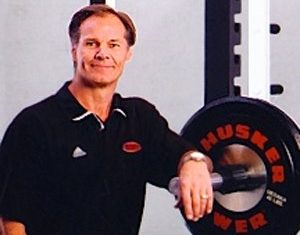
GF: Yeah, (laughs) and Dan Young a little bit, too.
Q: I didn’t know you were Boyd’s golf buddy. That’s a lot of golf, my friend! (laughs)
GF: Yeah, we’d run out to Hillcrest, and if there was no one around we could cover 18 holes in about two hours.
Q: Boyd would stretch the players out before practice and get a golf game in with just enough time to get back to the stadium for the post-practice lifting, huh?
GF: Yeah, that was about it.
Q: Any players you had special relationships with? Special names or faces come to mind?
GF: Oh gee, a lot of them. I remember a lot of them just from a standpoint of seeing them once in awhile. I guess maybe some of them are from earlier than the ’90’s group: William Washington, Mitch Krenk, those guys, I’ve stayed in contact with them. I remember the Harry Grimmingers and Ken Graebers and those guys just because of the way they carried on. (laughs) There were quite a few, Bobby Newcombe, he was dating a girl who worked in our office, a student. Bobby was around a lot. I could think of more if I sat around and thought about it.
Q: So what was your busiest time of the year, your craziest? End of July?
GF: Yeah, that period: June and July. July especially, because we were setting up the budgets for the next year. And then, of course, football season itself: home games it was seven days a week, and then with bowl games. Like I said, I did all the travel arrangements and worked with the hotels and stuff like that, so that was a busy time.
Q: I would suppose so. So after the Oklahoma game was over you were usually scrambling to make things happen?
GF: Oh yeah, a lot of times we’d leave from the Oklahoma game straight for the bowl site if we knew ahead of time where we were going, and a lot of times we did. There were a lot of times we’d have a private plane standing by and there were three or four of us would leave right after the game and fly to Miami or fly to Phoenix or wherever.
Q: Who else would be on the plane with you?
GF: Usually either Devaney or Bill Byrne, depending on who was Athletic Director. Usually Don Bryant and George Sullivan and myself.
Q: That’s a crew right there!
GF: A lot of times Jack Goebel of the University Administration would go along, too.
Q: How long would you be on-site then?
GF: Oh, just a couple three days. Doing the advance work for the stay.
Q: Any good stories?
GF: Usually those things were pretty well set up. A lot of times the bowl pretty well determined -especially in the later years-it was determined, “You’re staying at this hotel, here’s the bus company you’re working with”- where earlier, back in the ’80’s it was left up to us: “You can stay at whatever hotel you want to stay at, find your own transportation.” Most of the people we worked with on those occasions were good and it was usually during the regular season if you were going to have problems, that’s where it happened. If you were going into a new place that you hadn’t stayed before and you’re at the whim of making sure a bus company shows up when they’re supposed to. Usually they did. There was only one time we ran into problems, when we went out to UCLA one time. The bus company for some reason went to the wrong airport. We had to sit on the tarmac for 45 minutes to an hour waiting for them to come.
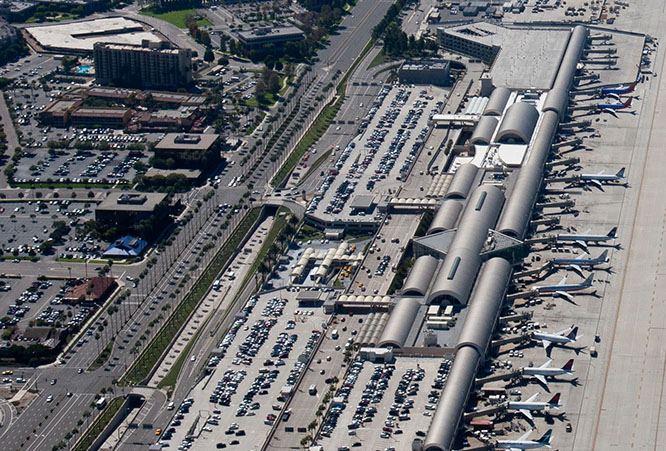
Q: You’re at LAX and they’re at John Wayne?
GF: It was at Orange County and they didn’t come to the right one. (laughs) Those things. And especially when you fly into some major city and such, where airport security was a little tighter, like Lincoln, and Coach would sometimes get a little upset if they made us sit and wait for a security escort and things like that. (laughs)
Q: Interesting. Save those players’ legs, right?
GF: Yeah. (laughs)
To be continued tomorrow….
Copyright @ 2013 Thermopylae Press. All Rights Reserved.
Photo Credits : Unknown Original Sources/Updates Welcomed
Author assumes no responsibility for interviewee errors or misstatements of fact.